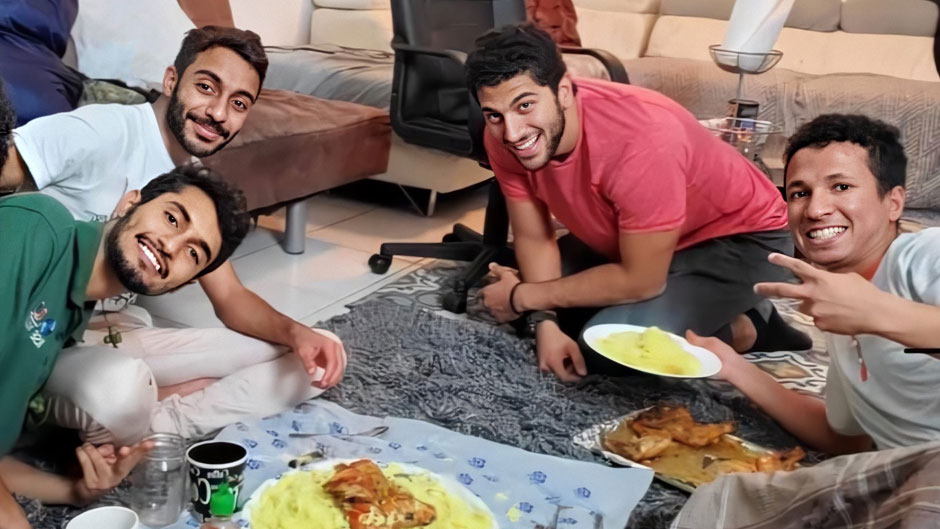Each day throughout the holy month of Ramadan—which began April 23 and will conclude on May 23—the global Muslim community, nearly a third of the world’s population, fasts together.
That means no food or water from dawn until sunset. And, in the evenings, fasts are broken ceremoniously with family and friends. Fasting together, then eating and praying together are essential elements of the yearly Ramadan tradition, but because of the coronavirus pandemic, many traditions are on hold this year.
Abdulrahman Bin Damnan is the president of the Muslim Students of the University of Miami (MSUM) organization. While dealing with all the obstacles of a global pandemic, he has also been fasting every day.
“While some people might think of fasting as an unbearable task, Ramadan is nevertheless a month of elevating spirituality and enjoying sociability,” he said.
Bin Damnan is originally from Yemen. Along with other Yemeni students at the University, he cannot see his family often, which makes the social aspect of Ramadan more challenging. In addition, the United States is currently restricting travel from Yemen, where his family still lives.
“We don’t want to risk it and go back and then maybe somehow we cannot come back here. We want to finish our degrees,” said Al Mahdi Bokhait, Bin Damnan’s friend and fellow Yemeni student.
Neither Bin Damnan nor Bokhait have seen their families in more than four years.
“I would be remiss if I said I did not miss celebrating Ramadan with my family in Yemen,” Bin Damnan remarked.
In 2018, Bin Damnan, Bokhait, and other MSUM students began hosting iftar (the evening meal that breaks the fast) on campus every day around sunset during the holy month. The iftar would take place outside the La Gorce House, behind the Watsco Center. It quickly became a MSUM tradition and attracted Muslim and non-Muslim students alike. According to Bokhait, the gatherings were a great substitute for not having family around—something he was looking forward to this year.
“You want to see other Muslims and feel like you’re with the community,” Bokhait said, “but this year everything just stopped, and everyone’s at home.”
Luckily, Bokhait has roommates, two Yemeni and one Kuwaiti. “We cook every day and during this Ramadan we also pray together,” Bokhait said.
Bin Damnan said it is no exaggeration to call Islam “a social religion.” While he has encouraged other MSUM students to reach out to local mosques during Ramadan, they must to do so virtually and in adherence with social distancing guidelines.
Imam Abdul Hamid Samra is the Muslim chaplain at the University of Miami as well as the director of the Islamic Center of Greater Miami. He has stayed in contact with some MSUM students, and he has even been conducting virtual programs, prayers, and classes through the Islamic Center. While he especially misses greeting and talking to people during Friday prayers, he believes there is good reason for keeping the mosque closed.
“When we pray, we stand next to each other and this means if one is sick then everyone can get sick,” Samra said, “But [closing the mosque] wasn’t easy.”
Samra has been encouraging others to stay home, pray with their families, and pray privately.
That is exactly what he has been doing. And, without families nearby, Bokhait and Bin Damnan have also had to focus on different ways of connecting with God and others.
“While I cannot see my family physically, I still remain connected spiritually during this unifying experience,” Bin Damnan said.
Bokhait has also been staying in touch with his family. He is currently collecting monetary donations through social media to send to his hometown of Aden, Yemen, which was recently hit by severe flooding. Acts of charity are traditionally another important part of Ramadan, and Bokhait hopes that whatever amount he garners can help the needy in Aden.
As the coronavirus pandemic continues, it is likely that the celebrations at the end of Ramadan, which conclude May 23 and are called Eid Al Fitr, will be much more subdued than previous years.
“We’ll continue to pray and encourage others to spread positivity,” Bin Damnan said. “Hopefully our prayers will be answered in a timely manner.”

